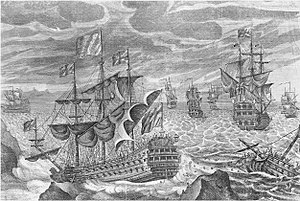HMS Firebrand (1694)
 Sir Cloudesly Shovel in the Association with the Eagle, Rumney and the Firebrand, lost on the rocks of Scilly
| |
| History | |
|---|---|
| Name | Firebrand |
| Builder | Limehouse[1] |
| Launched | 1694 |
| Fate | Ran aground in 1707 |
| General characteristics | |
| Class and type | Fireship |
| Tons burthen | 268 bm[2] |
| Complement | 45[2] |
| Armament |
|
Firebrand was a Royal Navy fireship built at Limehouse in 1694,[3] the first Royal Naval vessel to bear the name.
Service[edit]
Firebrand served in the Caribbean and Mediterranean.[2] She is recorded as convoying five merchantmen in company with Winchester near Barbados in March 1695.[4]
Loss[edit]
Firebrand was lost during the Scilly naval disaster of 1707 when a navigational error sent Admiral Sir Cloudesley Shovell's fleet through dangerous reefs west of Cornwall while on their way from Gibraltar to Portsmouth. On the night of 22 October 1707, Firebrand, commanded by Captain Francis Percy, smashed into the Outer Gilstone Rock off the Isles of Scilly. She was lifted off by a huge wave first, and Percy managed to steer his badly damaged ship along the southern side of the Western Rocks[5] between St Agnes and Annet, but she foundered in Smith Sound, sinking close to Menglow Rock and losing 28 of her crew of 40.[6] Percy and a group of his men managed to get ashore by boat, another five of the crew got ashore on pieces of wreckage.[7] Three more ships (Eagle, Romney and Shovell's flagship Association) also sank that night, bringing the total of sailors lost to nearly 2,000.[8] The Scilly naval disaster was one of the greatest maritime disasters in British history. It was largely as a result of this disaster that the Board of the Admiralty instituted a competition for a more precise method to determine longitude.
Discovery of the wreck[edit]
Firebrand lies between the islands of St Agnes and the islet of Annet in position 49°53′20″N 06°20′35″W / 49.88889°N 6.34306°W[9] at a depth of 8 to 25 meters.[10] The wreck was discovered in Smith Sound in 1982, and several items were recovered, including guns and anchors, a wooden "nocturne" (for the time at night), a bell and carved cherubs.[11] In 2006, researchers and students from Bristol University conducted the first archaeological survey of the vessel. This was also the first physical study of this type of Royal Navy ship.[1][2]
References[edit]
- ^ a b "Bristol University News, 19 July 2006 - "Scillies shipwreck investigated"". Retrieved 12 September 2008.
- ^ a b c d e Caroline Lewis (27 July 2006). "Archaeologists investigate 18th Century Scilly Isles Fireship wreck". Culture24. Retrieved 8 December 2009.
- ^ "Firebrand at the Age of Nelson website". Retrieved 12 September 2008.
- ^ "British History Online". Retrieved 12 September 2008.
- ^ "Sir Clowdisley Shovell and The Association - Submerged".
- ^ HMS Association (+1707) on www.wrecksite.eu
- ^ "The legacy of Sir Cloudsley Shovel".
- ^ Sobel, Dava, Longitude: The True Story of a Lone Genius Who Solved the Greatest Scientific Problem of His Time, Fourth Estate Ltd., London 1998, p. 6, ISBN 1-85702-571-7
- ^ "Archeological Report on the Tearing Ledge, Scilly Isles" (PDF). Retrieved 12 September 2008.
- ^ "Dive Site Directory". Retrieved 12 September 2008.
- ^ "News - 2007". International Journal of Nautical Archaeology. 11 (3): 254–257. 1982. doi:10.1111/j.1095-9270.1982.tb00088.x.

